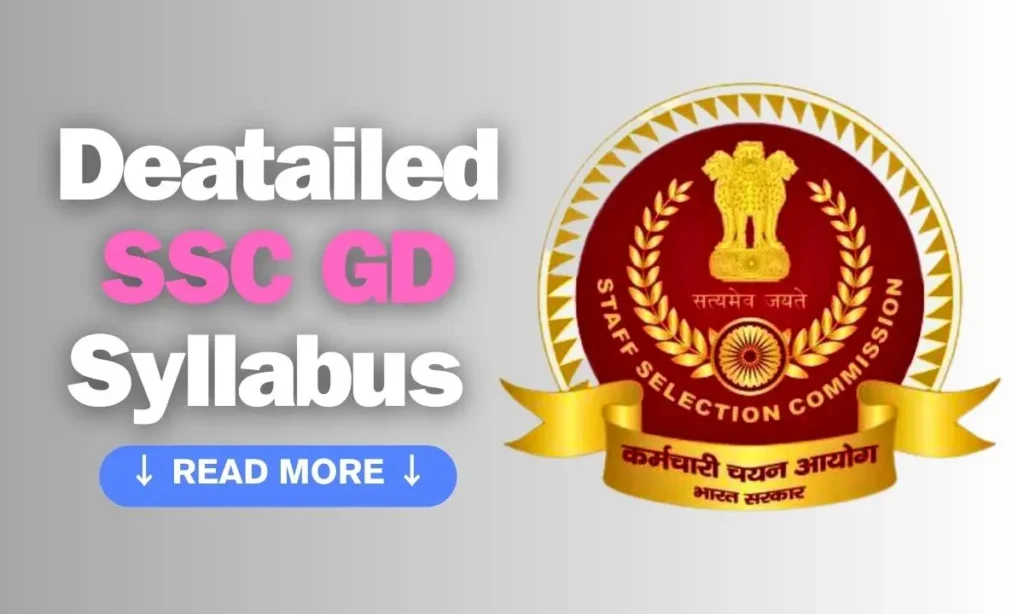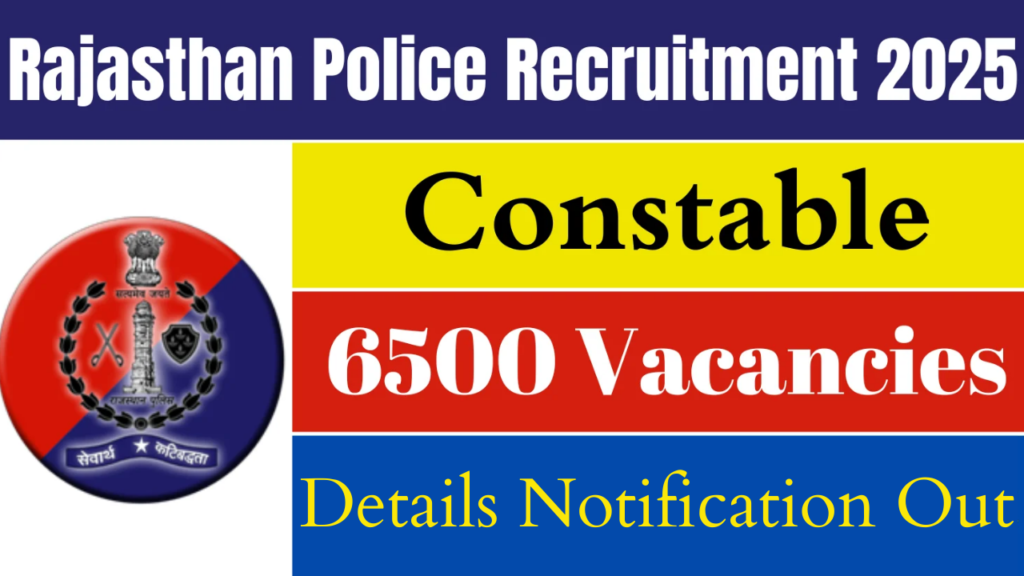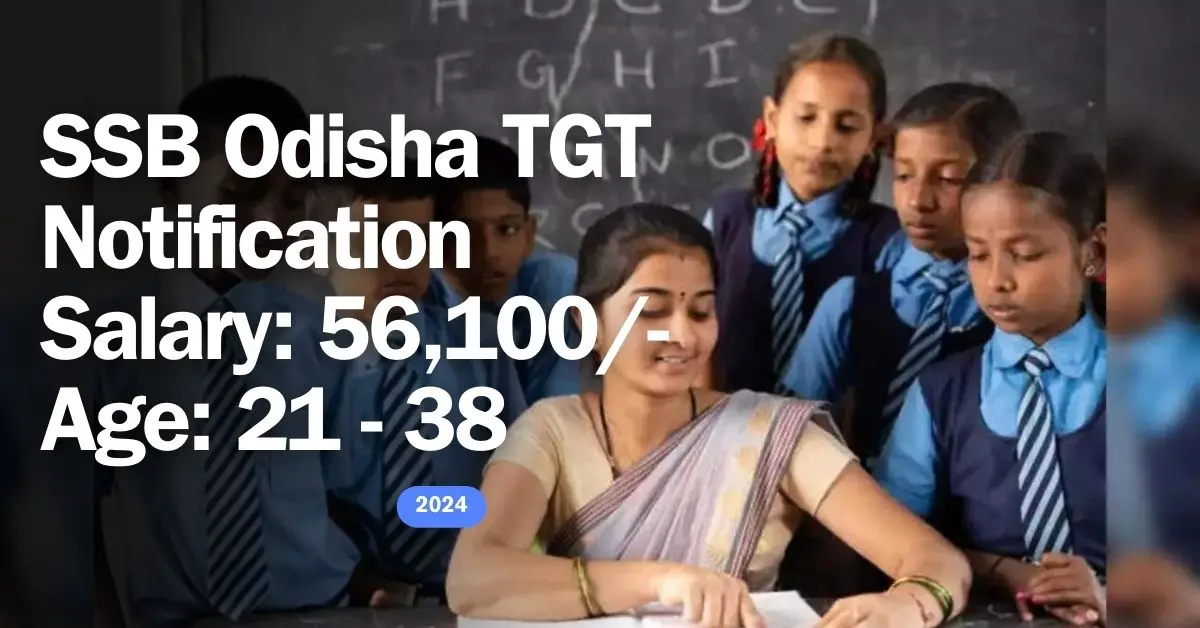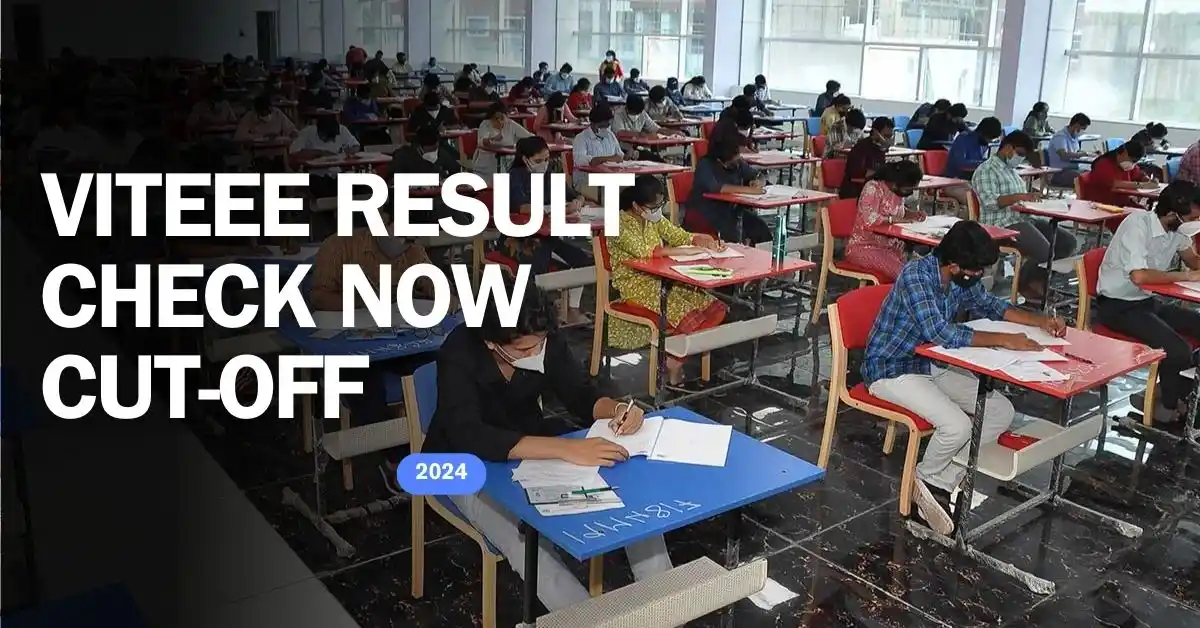Are you about to take the SSC GD Exam? then you’re in the right place as today we are about to tell you about the SSC GD Syllabus 2024, we will also tell you the information about the SSC GD 2024 Vacancy.
It is very important to know the SSC GD New Syllabus before you sit for the SSC GD Exam, we have given you all the information about the SSC GD Constable Syllabus 2024, so feel free to share it with your friends.

Contents
SSC GD 2024 Exam Overview
Exam Name– CAPF, ANIF, SSF, Constable GD
Selection Process – CBE (Computer Based Examination), PET (Physical Efficiency Test), DME (Detailed Medical Examination).
Exam Time – 1 Hour
Negative Marking – 1/2 Negative marking for the wrong answer.
Exam Language – Hindi & English only
Type Of Questions – MCQ
Exam Category – Government Exam
Official Website – https://ssc.nic.in/
SSC GD Constable 2024 Exam Pattern
- It is a computer-based exam i.e. SSC GD is an online exam.
- Each question will contain 2 marks.
- There will be a total of 80 questions
- There are only 2 languages to select from 1. Hindi, 2. English.
- If you pass the examination then you will be selected for the next stage which is the PET – Physical Efficiency Test
Screenshot This & Save-
| Exam Name | SSC GD Constable Exam 2024 (CAPF, ANIF, SSF, Constable GD). |
| Language Option | Hindi & English. |
| Selection Process | CBE (Computer Based Examination), PET (Physical Efficiency Test), DME (Detailed Medical Examination). |
| No. Of Questions | 80 |
| Markings | Right Answer: (+2) Wrong Answer (-1/2). |
| Type Of Questions | MCQ only. |
| Type Of Exam | Government Exam |
| Next Stage | PET (Physical Efficiency Test) |
| Exam Time | 1 Hour (60 min.) |
SSC GD Exam 2024 Constable Selection Process
In the first stage of the selection process, you have to take the SSC GD exam, once your marks are above or equal to the cut-off you will be selected for The PET which stands for Physical Efficiency Test.
You you pass the PET the last stage will be the DME which stands for Detailed Medical Examination, if you pass this examination as well then you will be selected for SSC GD Exam 2024 Constable.
SSC GD 2024 Vacancy
There are a total of 26146 vacancies available for the SSC GD constable exam, among which 23347 are male vacancies and 2799 are female vacancies, in order to be eligible for the SSC Exam you will have to be 10th pass from a recognized board.
you also have to be between the ages of 18-25 to take this examination, the application process has already begun and the last date for applying for the exam is 31st December 2023, after that no further applications will be accepted.
Screenshot This & Save-
| SSC GD 2024 Vacancy | 26146 |
| Male Vacancy | 23347 |
| Female Vacancy | 2799 |
| Eligibility Criteria | 10th Pass |
| Age Limit | 18yrs – 25yrs |
| Application Start date | 24 November 2023 |
| Application last Date | 31 December 2023 |
| Written Exam Date | February – March 2024 |
SSC GD Maths Syllabus 2024
Number Systems
- Introduction to number systems (natural, whole, integer, rational, irrational, real and complex)
- Conversion between different number systems
- Properties of numbers (divisibility, factors, multiples, HCF, LCM)
- Basic operations on numbers (addition, subtraction, multiplication, division)
- Exponents and radicals
Decimals and Fractions
- Introduction to decimals and fractions
- Conversion between decimals and fractions
- Operations on decimals and fractions
- Applications of decimals and fractions
Relationship Between Numbers
- Ratios and proportions
- Percentages
- Averages
- Profit and loss
- Interest
Fundamental Arithmetical Operations
- Addition
- Subtraction
- Multiplication
- Division
Mensuration
- Area and perimeter of plane figures (triangle, rectangle, square, circle)
- Volume and surface area of solids (cube, sphere, cylinder)
Time and Distance
- Speed, time, and distance problems
- Simple and compound interest problems
Ratio and Proportion
- Introduction to ratios and proportions
- Applications of ratios and proportions
Interest
- Simple interest
- Compound interest
Profit and Loss
- Profit and loss calculations
- Discount calculations
Discount
- Trade discount
- Cash discount
Mensuration
- Area and perimeter of plane figures
- Volume and surface area of solids
Time, Distance
- Speed, time, and distance problems
Ratio, Time, Work
- Ratio and time
- Ratio and work
- Time and work
SSC GD GK Syllabus 2024
General Intelligence and Reasoning
- Analogies
- Similarities and differences
- Spatial visualization
- Spatial orientation
- Visual memory
- Discrimination
- Observation
- Relationship concepts
- Arithmetical reasoning
- Figural classification
- Arithmetic number series
- Non-verbal series
- Coding and decoding
General Awareness and General Knowledge
- Geography
- History
- Economy
- General polity
- Indian Constitution
- Scientific research
- Culture
- Sports
SSC GD General Reasoning Syllabus 2024
- Analogies: Identifying relationships between words or concepts.
- Similarities and Differences: Comparing and contrasting items or concepts.
- Spatial Visualization: Understanding and manipulating spatial relationships.
- Spatial Orientation: Recognizing and reproducing spatial patterns.
- Visual Memory: Recalling visual information accurately.
- Discrimination: Identifying similarities and differences among items.
- Observation: Detecting details and patterns in visual information.
- Relationship Concepts: Understanding relationships between numbers, letters, symbols, and figures.
- Arithmetical Reasoning: Solving arithmetic problems using logic and reasoning.
- Figural Classification: Grouping figures based on shared characteristics.
- Arithmetic Number Series: Identifying patterns and rules in number sequences.
- Non-verbal Series: Understanding patterns in non-verbal sequences using symbols and figures.
- Coding and Decoding: Decoding coded messages and encoding given information.
- Series Completion: Identifying the missing element in a given series.
- Direction and Distance: Understanding and interpreting directions and distances.
- Time Sequence: Arranging events in chronological order.
- Logical Deductions: Drawing conclusions based on given information.
- Assumption and Conclusions: Identifying assumptions and evaluating their validity.
- Cause and Effect: Understanding the relationship between causes and their effects.
- Syllogisms: Solving syllogistic reasoning problems.
- Critical Reasoning: Evaluating arguments and identifying fallacies.
- Problem-Solving: Applying reasoning skills to solve complex problems




